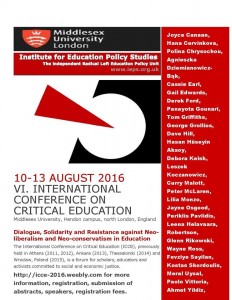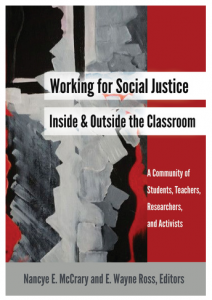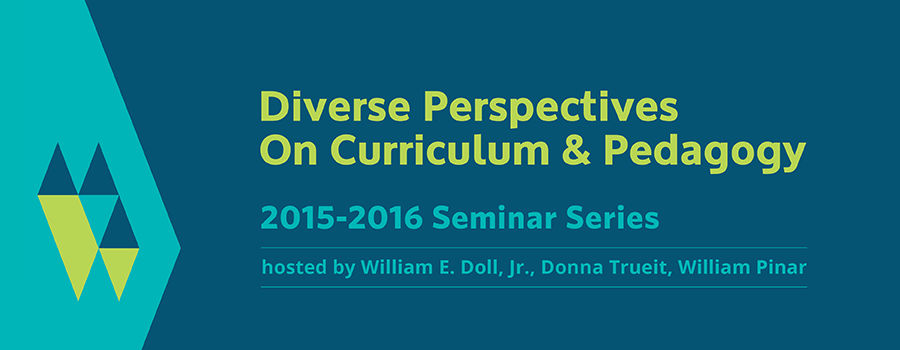-
Recent Posts
- New issue launch Workplace: A Journal for Academic Labor #35 (2024-2025)
- New issue of Critical Education (vol 16 no 2, Feb. 1 2025)
- New issue of Critical Education (vol. 15 no. 4, 2024)
- Call for Submissions: Heed the Call of the Dreamers! Imagination and the Frontiers of Critical Scholarship
- Critical Education: Call for manuscript reviewers
Recent Comments
- E Wayne Ross on The Courage of Hopelessness: Democratic Education in the Age of Empire [Video]
- George Rammell on The Courage of Hopelessness: Democratic Education in the Age of Empire [Video]
- Shannon M on BC elementary school bans touching at recess #NoMoreTag #bced #yteubc #occupyeducation
- SD61 Board Meeting, June 17, 2013: The Record Off The Record: It Sounds So Nice | Lined Paper on BC schools face total budget shortfall of $130 million #bcpoli
- Monday Memo – June 3, 2013 | Surrey Teachers Association on BC Teachers Federation scores landmark victory in academic freedom and freedom of expression #bcpoli
Archives
- May 2025
- January 2025
- November 2024
- October 2024
- September 2024
- January 2024
- October 2023
- August 2023
- December 2020
- May 2020
- March 2020
- January 2020
- August 2017
- March 2017
- February 2017
- January 2017
- September 2016
- July 2016
- May 2016
- February 2016
- January 2016
- October 2015
- June 2015
- April 2015
- February 2015
- January 2015
- May 2014
- November 2013
- October 2013
- September 2013
- August 2013
- July 2013
- June 2013
- May 2013
- April 2013
- March 2013
- February 2013
- January 2013
- December 2012
- November 2012
- October 2012
- August 2012
- July 2012
- June 2012
- May 2012
- April 2012
- March 2012
- February 2012
Categories
- Academic freedom
- Adjuncts
- Administration
- BC Education
- Budgets & Funding
- CAUT
- CFPs
- Civil Liberties
- Commentary
- Conferences
- Contracts
- Corporate University
- Critical Education
- Disputes
- Environment
- Equity
- Ethics
- Faculty
- Free speech
- Governance
- Government
- Idle No More
- Job cuts
- K-12 issues
- Layoffs
- Legal issues
- Organizing
- Privatization
- Protests
- Publishing
- Research
- Salary/Economic Benefits
- Strikes & Labor
- Student Movement
- Student Speech
- Students
- Talks and seminars
- Teachers
- Tenure & Promotion
- Testing
- Textbooks
- Uncategorized
- Unions
- University Presidents
- Violence
- Working condition
Meta
-
Monthly Archives: February 2016
New Book: Working for Social Justice Inside and Outside the Classroom
We am pleased to announce a new book just published by Peter Lang, Working for Social Justice Inside and Outside the Classroom: A Community of Students, Teachers, Researchers, and Activists, which E. Wayne Ross co-edited.
Working for Social Justice Inside and Outside the Classroom delivers critical counter-narratives aimed at resisting the insatiable greed of a few and supporting a common good for most. The book reflects the efforts of a hopeful community, the Rouge Forum, which has been working against perpetual war, corporate education reform, the destruction of our natural environment, increasing poverty, and social inequalities as they fight to preserve democratic ideals in a just and sustainable world. Written teachers, researchers, and activists, this collection is a tapestry of social justice issues woven in and out of formal and informal education.
The Rouge Forum has endured for two decades, a group of educators, students, parents, organizers, and activists who persist in working for social justice, democratic education and a common good. Founded by social education teachers, scholars, and activists, the Rouge Forum moves like waves that, once set in motion, are unstoppable. This remarkably inclusive community has been sustained with hundreds of thousands of visitors to the Rouge Forum website, annual conferences held throughout the United States and Canada, and many of the original founders continuing to ride the waves of change.
The Rouge Forum is uniquely inclusive. Educators, scholars, students, writers, union organizers, artists, and many more gather each year for dialogic interaction and learning together. Membership crosses cultural, national, racial, and class boundaries in the struggle for a just and sustainable world.
Rouge Forum conferences aim to foster dialogue among participants rather than stand-and-deliver speeches. Panel and roundtable discussions are encouraged. As one student said after presenting on a panel at the 2014 Denver Conference, “As we went one by one, you could tell that our confidence continued to rise. When we completed our panel, the crowd kept the conversation going with questions …about our ideas…on how to have dialogic discussions and [build] communities….” She continued saying that the participants were not asking questions about what they knew, how much they had prepared for their panel presentation, instead they wanted to know what those students thought. She ended by saying “…this experience was one for the books.”
This book was written for those who fight for democratic ideals and work against perpetual war, the destruction of our natural environment, and increasing poverty and social inequalities. As the world watches the skewed mass media portrayal of the 99%, the people of the Rouge Forum stand together to delivering a counter-narrative.
Contents:
Nancye McCrary & E. Wayne Ross: Working for Social Justice Inside and Outside the Classroom: A Community of Teachers, Researchers, and Activists
Nancye McCrary: The Last Teacher
Staughton Lynd: What Is to Be done?
Susan Ohanian: Against Obedience
Alan Singer & Eustace Thompson: Pearson, Inc.: Slashing Away at Hercules’ Hydra
Faith Agostinone-Wilson: Relation of Theory and Research to Practice in Social Justice Education – On the Urgency and Relevance of Research for Marxists
Four Arrows & Darcia Narvaez: Reclaiming Our Indigenous Worldview: A More Authentic Baseline for Social/Ecological Justice Work in Education
Rich Gibson: Why It Is Possible and Imperative to Teach Capital, Empire, and Revolution – and How.
Dave Hill: Class Struggle and Education: Neoliberalism, (Neo)conservatism, and the Capitalist Assault on Public Education
Doug Selwyn: Social Justice in the Classroom? It Would Be a Good Idea
Patrick Shannon: Poverty, Politics, and Reading Education in the United States.
Glenabah Martinez: Counter-Narratives in State History: The 100 Years of State and Federal Policy Curriculum Project
E. Wayne Ross: Broadening the Circle of Critical Pedagogy
Leah Bayens: Social Justice Education Outside the Classroom: «Putting First Things First»: Obligation and Affection in Ecological Agrarian Education.
Tara M. Tuttle: «Barely in the Front Door» but Beyond the Ivory Tower: Women’s and Gender Studies Pedagogy Outside the Classroom
Paul Street: Our Pass-Fail Moment: Livable Ecology, Capitalism, Occupy, and What Is to Be Done
Brad J. Porfilio & Michael Watz: Youth-Led Organizations, the Arts, and the 411 Initiative for Change in Canada: Critical Pedagogy for the 21st Century.
Working for Social Justice Inside and Outside the Classroom, is the second book published in the Peter Lang book series Social Justice Across Contexts in Education.
Read the read the preface and introduction here.
The Courage of Hopelessness: Democratic Education in the Age of Empire [Video]
Dr. E. Wayne Ross | Professor, EDCP
January 15, 2016
Short Bio:
E. Wayne Ross is Professor in the Department of Curriculum and Pedagogy at UBC. He has written and edited numerous books including: Critical Theories, Radical Pedagogies and Social Education (Sense, 2010); The Social Studies Curriculum: Purposes, Problems and Possibilities (4th Ed., SUNY Press, 2014) and Working for Social Justice Inside and Outside the Classroom (Peter Lang, 2016). He also edits the journals Critical Education, Workplace: A Journal for Academic Labor, and Cultural Logic.
Abstract:
In this talk I argue there is a disconnect between the rhetoric and reality of democracy in North America that subverts traditional approaches to democratic education. The tropes that have historically dominated the discourse on democracy and democratic education now amount to selling students (and ourselves) a lie about history and contemporary life. Our challenge is to re-imagine our roles as educators and find ways to create opportunities for students to create meaningful personal understandings of the world. Education is not about showing life to people, but bringing them to life. The aim is not getting students to listen to convincing lectures by experts, but getting them to speak for themselves in order to achieve, or at least strive for an equal degree of participation and a more democratic, equitable, and justice future. This requires a new mindset, something I call dangerous citizenship.
Educate. Agitate. Organize: New and Not-So-New Teacher Movements
Never a dull moment these days in Education activism! Parallel with the fallout from records regarding the governance and management of UBC and calls for accountability by our Faculty Association is the BCTF’s work in holding the government to account for its legislation of bargaining rights.
Of course, our Institute for Critical Education Studies has provided extensive analysis and commentary on both cases.
Keeping activism in context, we are thrilled to launch this Special Issue of Workplace: A Journal for Academic Labour:
Educate. Agitate. Organize: New and Not-So-New Teacher Movements
Special Issue Edited by Mark Stern, Amy E. Brown & Khuram Hussain
Forward: The Systemic Cycle of Brokenness
Tamara Anderson
Introduction to the Special Issue: Educate. Agitate. Organize: New and Not-So-New Teacher Movements
Mark Stern, Amy E. Brown, Khuram Hussain
Articles
Principles to Practice: Philadelphia Educators Putting Social Movement Unionism into Action
Rhiannon M Maton
Teaching amidst Precarity: Philadelphia’s Teachers, Neighborhood Schools and the Public Education Crisis
Julia Ann McWilliams
Inquiry, Policy, and Teacher Communities: Counter Mandates and Teacher Resistance in an Urban School District
Katherine Crawford-Garrett, Kathleen Riley
More than a Score: Neoliberalism, Testing & Teacher Evaluations
Megan E Behrent
Resistance to Indiana’s Neoliberal Education Policies: How Glenda Ritz Won
Jose Ivan Martinez, Jeffery L. Cantrell, Jayne Beilke
“We Need to Grab Power Where We Can”: Teacher Activists’ Responses to Policies of Privatization and the Assault on Teachers in Chicago
Sophia Rodriguez
The Paradoxes, Perils, and Possibilities of Teacher Resistance in a Right-to-Work State
Christina Convertino
Place-Based Education in Detroit: A Critical History of The James & Grace Lee Boggs School
Christina Van Houten
Voices from the Ground
Feeling Like a Movement: Visual Cultures of Educational Resistance
Erica R. Meiners, Therese Quinn
Construir Y No Destruir (Build and Do Not Destroy): Tucson Resisting
Anita Fernández
Existential Philosophy as Attitude and Pedagogy for Self and Student Liberation
Sheryl Joy Lieb
Epilogue
No Sermons in Stone (Bernstein) + Left Behind (Austinxc04)
Richard Bernstein, Austinxc04
Thanks for the continued interest in and support of our journals, Critical Education and Workplace, and our ICES and Workplace blogs. And please keep the manuscripts and ideas rolling in!
Posted in Publishing
Tagged Academic freedom, Chicago, Chicago Teachers Union, CTU, Detroit, Detroit schools, education policy, educational resistance, Indiana, K-12 issues, neoliberalism, Organizing, Philadelphia schools, Research, right to work, social movements, teacher education, teacher resistance, teacher unions, Testing, Tuscon, urban education, Workplace Journal
CFP: AVPC 2016: Visual Pedagogies and Digital Cultures
Call for Papers AVPC 2016
We are pleased to announce the Second Call for Papers for the first Association of Visual Pedagogies Conference AVPC 2016: Visual Pedagogies and Digital Cultures. The conference is hosted by the University of Applied Sciences in Zagreb, Croatia, on June 18-19 2016.
Peer reviewed conference articles will be published in The Video Journal of Education & Pedagogy (Springer) and a invited selection from the conference will be published as a special issue by conference organisers in consultation with the Editor-in-Chief, Michael A. Peters.
Please send an abstract of no more than 400 words to Petar Jandrić (pjandric@tvz.hr) by 15 February 2016.
Conference website: http://avpc.tvz.hr/
We look forward to meeting you in Zagreb!
Conference Committee:
Petar Jandrić, University of Applied Sciences, Croatia, Michael A. Peters, University of Waikato, New Zealand, Tina Besley, University of Waikato, New Zealand, Jayne White, University of Waikato, New Zealand, Kathrin Otrel-Cass, Aalborg University, Denmark, John O’Neill, Massey University, New Zeland, Milan Bajić, University of Applied Sciences, Croatia.
Tagged AVPC, CFP, CFPs, digital cultures, visual pedagogies
CALL FOR PAPERS: Special issue of Policy Futures in Education Lefebvre’s teachings
CALL FOR PAPERS:
Special issue of Policy Futures in Education
Lefebvre’s teachings
Lefebvre’s teachings
Guest editor: Derek R. Ford, PhD
Although the person of Henri Lefebvre has been gone since 1991, the exploration of the implications of his thought for a variety of disciplines and social movements is still in its infancy. And it is likely to be a long life, as Lefebvre wrote over 60 books throughout his life, in addition to numerous articles, edited volumes, and lectures. Not only is the translation of his work into English still incomplete, but new manuscripts are still being discovered, Towards an Architecture of Enjoyment being the most recent.
Lefebvre’s thought has been most influential in geography and urban studies, animating key debates around, for example, the primary and secondary circuits of capital, industrialism versus urbanism, and spatial production more generally. It is primarily this body of secondary literature that has helped Lefebvre’s thought spread outward. Relatedly, his work on the right to the city has sparked a whole host of academic debates and policy formulations, and even some political coalitions. The growing importance of struggles over space in protest, social, and resistance movements across the globe has, to be sure, energized this interest.
Educational theory, research, and policy, however, have yet to engage with Lefebvre’s vast body of work in a sustained manner. There are just a handful of articles deeply engaging Lefebvre (e.g., Atasay and Delavan, 2012; Christie, 2013; Ford, 2013, in press; Taylor and Helfenbein, 2009) and one dedicated monograph (Middleton, 2013), although his work is referenced in and gestured toward quite a bit more often, primarily in sociology of education.
This special issue of Policy Futures in Education will be the first journal issue to focus specifically on Lefebvre’s thought and its import for educational theory, research, and policy. While authors need not be in the field of education proper, we seek submissions that represent sustained educational encounters with Lefebvre. Papers might examine Lefebvre’s work on everyday life and sociology, the state, rhythmanalysis, architecture, Marxism, dialectical materialism, Nietzsche, modernity, cities, space, or urbanism, and how this work relates to educational philosophies, practices, research, and policies. We are open to papers that explore Lefebvre’s relevance for education as well as papers that explore education’s relevance for Lefebvrean thought. If you are unsure if your topic will fit with the issue, please e-mail the editor for feedback.
Timeline:
An early expression of interest and a 200-300 word abstract is preferred by April 1st, 2016. Manuscripts—which should adhere to normal journal requirements—will be due October 1st, 2016. The expression of interest and abstract should be sent to drford@syr.edu. Authors of successful expressions of interest/abstracts will be directed to submit full manuscripts at http://mc.manuscriptcentral.com/pfie.
About the guest editor:
Derek R. Ford is a teacher, organizer, and writer living in Philadelphia, PA, USA. He received his PhD in cultural foundations of education from Syracuse University in 2015. He has published several articles on Lefebvre and education and recently co-edited a special journal issue on education and the right to the city. His most recent books are Marx, capital, and education: Towards a critical pedagogy of becoming (with Curry Malott) and Leaders in critical pedagogy: Narratives for understanding and solidarity (with Brad Porfilio). His latest book, The secret and struggle of study: Political economy, alterity, pedagogy, will be published this year by Lexington Books.
References:
Atasay, E., & Delavan, G. (2012). Monumentalizing Disaster and Wreak-construction: a case study of Haiti to rethink the privatization of public education. Journal of Education Policy, 27(4), 529-553.
Christie, P. (2013). Space, Place, and Social Justice: developing a rhythmanalysis of education in South Africa. Qualitative Inquiry, 19(10), 775-785.
Ford, D.R. (2013). Toward a Theory of the Educational Encounter: Gert Biesta’s educational theory and the right to the city. Critical Studies in Education, 54(3), 299-310.
Ford, D.R. (in press). A Pedagogy for Space: teaching, learning, and studying in the Baltimore Rebellion. Policy Futures in Education.
Middleton, S. (2013). Henri Lefebvre and Education: space, history, theory. London and New York: Routledge.
Taylor, H. L., & Helfenbein, R. J. (2009). Mapping Everyday: gender, Blackness, and discourse in urban contexts. Educational Studies, 45(3), 319-329.


 Follow
Follow

